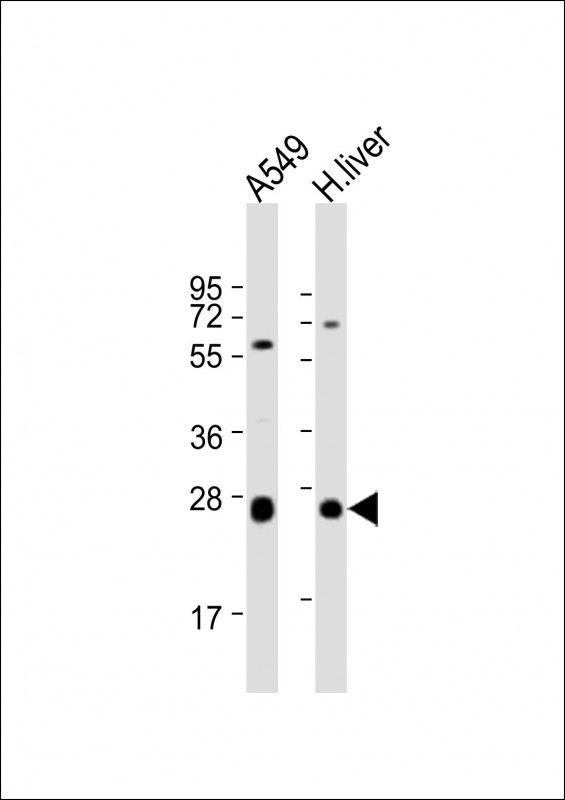
| WB | 咨询技术 | Human,Mouse,Rat |
| IF | 咨询技术 | Human,Mouse,Rat |
| IHC | 1/50-1/100 | Human,Mouse,Rat |
| ICC | 技术咨询 | Human,Mouse,Rat |
| FCM | 咨询技术 | Human,Mouse,Rat |
| Elisa | 咨询技术 | Human,Mouse,Rat |
| Aliases | Pro-thyrotropin-releasing hormone, Pro-TRH, Prothyroliberin, Thyrotropin-releasing hormone, TRH, Protirelin, TSH-releasing factor, Thyroliberin, Thyrotropin-releasing factor, TRF, TRH |
| Entrez GeneID | 7200 |
| WB Predicted band size | 27.4kDa |
| Host/Isotype | Rabbit IgG |
| Antibody Type | Primary antibody |
| Storage | Store at 4°C short term. Aliquot and store at -20°C long term. Avoid freeze/thaw cycles. |
| Species Reactivity | Human, Mouse, Rat |
| Immunogen | This TRH antibody is generated from a rabbit immunized with a KLH conjugated synthetic peptide between 157-191 amino acids from human TRH. |
+ +
以下是3篇关于TGF-β1抗体的代表性文献,按研究领域分类简述:
1. **文献名称**:*Targeting TGF-β1 in cancer with a novel type I receptor-directed antibody (1D11)*
**作者**:Yang et al.
**摘要**:该研究开发了一种靶向TGF-β1受体(ALK5)的单克隆抗体1D11.证明其通过阻断Smad2/3磷酸化抑制肿瘤微环境中的免疫抑制,显著延缓小鼠乳腺癌和黑色素瘤模型的肿瘤进展。
2. **文献名称**:*Neutralizing TGF-β1 antibody reduces skin fibrosis in experimental scleroderma*
**作者**:Lakoski et al.
**摘要**:使用抗TGF-β1中和抗体(GC1008)治疗硬皮病小鼠模型,结果显示抗体有效降低皮肤和肺部的胶原沉积,并抑制纤维化相关基因(如COL1A1、CTGF)表达,提示其治疗纤维化疾病的潜力。
3. **文献名称**:*Anti-TGF-β1 antibody improves renal fibrosis by restoring autophagy in diabetic nephropathy*
**作者**:Wang et al.
**摘要**:研究证明,抑制TGF-β1(通过抗体LY2382770)可逆转糖尿病肾病大鼠的自噬缺陷,减少肾小球系膜基质扩张和蛋白尿,机制涉及mTOR通路的下调。
4. **文献名称**:*TGF-β1 blockade with fresolimumab inhibits epithelial-mesenchymal transition in cancer cells*
**作者**:Morris et al.
**摘要**:临床试验前研究表明,人源化抗TGF-β1抗体Fresolimumab通过抑制EMT进程(如E-cadherin上调、Vimentin下调)增强化疗药物对转移性三阴性乳腺癌细胞的杀伤效果。
这些文献覆盖了抗体治疗在肿瘤、纤维化疾病中的机制与应用,可作为不同研究方向的参考。
TGF-beta 1 (Transforming Growth Factor-beta 1) is a multifunctional cytokine belonging to the TGF-beta superfamily, involved in regulating cell proliferation, differentiation, apoptosis, immune response, and extracellular matrix production. It plays critical roles in embryonic development, tissue repair, fibrosis, and cancer progression. Dysregulation of TGF-beta 1 signaling is linked to pathologies such as autoimmune diseases, chronic inflammation, and metastatic cancers.
Antibodies targeting TGF-beta 1 are essential tools for studying its expression, localization, and function. These antibodies are typically generated using recombinant TGF-beta 1 proteins or synthetic peptides as immunogens, produced in hosts like rabbits, mice, or goats. They enable detection of TGF-beta 1 in techniques such as Western blotting, immunohistochemistry (IHC), flow cytometry, and ELISA. Specificity varies; some antibodies recognize latent TGF-beta 1 (pro-form), while others detect active mature forms.
In research, TGF-beta 1 antibodies help elucidate its dual role as both a tumor suppressor (inhibiting early tumor growth) and a tumor promoter (enhancing metastasis via immune evasion and angiogenesis). They are also used to explore therapeutic strategies, such as blocking TGF-beta 1 to mitigate fibrosis or enhance antitumor immunity. Challenges include distinguishing between isoforms (e.g., TGF-beta 1 vs. TGF-beta 2/3) and ensuring accurate detection in complex biological samples. Validation using knockout controls or neutralizing assays is critical to confirm antibody reliability.
×